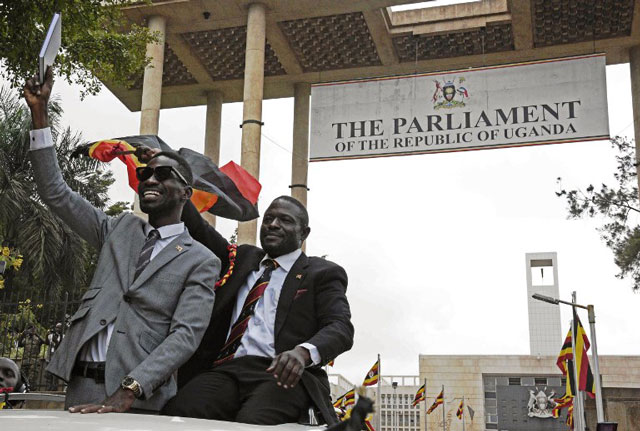
What seemed like a good run for the FDC due to the rancour over the age limit amendment fizzled out when NRM bounced back to win victories in elections held on July 27 for newly-created municipalities in Sheema, Kotido, Ibanda, and Nebbi. FDC performed dismally in this set of elections, appearing third in Bugiri and Ibanda.
The party’s defeat in Bugiri was more telling because it lost to JEEMA- an insignificant party by any standard. JEEMA rode on the national stature of its candidate and leader, Asuman Basalirwa, but it also has new kid on the block Kyagulanyi to thank for the win. Kyagulanyi added vibrancy to Basalirwa’s floundering campaign.
If the Bugiri loss was a wake-up call, the Arua by election for fallen legislator Ibrahim Abiriga was a bitter lesson. FDC’s Paul Musema polled a measly 1369 votes in fourth position and lost to Kassiano Wadri, an Independent candidate allied to the party.
Again, Kyagulanyi rose to the occasion, citing his disdain for parties although with an open rivalry with Besigye and helped Wadri romp to victory. It was the second time Kyagulanyi was emerging triumphant against Besigye.
Robert Centenary, FDC MP for Kasese Municipality, says some party leaders have learnt no lessons and the party could suffer more defeats. “Some people want to think for the party and if they continue like this with their egos, we will lose more,” he cautions.
He says the party is not true to the realities of the political environment. Centenary is perturbed that the way FDC is operating does not create room for teamwork. “We are in a lone fight,” he says, “When we were together, we won Jinja.”
He rebukes the defiance strategy although he chooses to remain in the party. “When Ingrid says I cannot allow Bobi Wine in Sheema, that tells you a lot,” he tells The Independent. According to Centenary, FDC has itself to blame for mistakes made. “There were no lessons from Bugiri, Arua and Sheema. If we cannot pick lessons, we are heading for doom.”
Kayihura’s fall
There was even more intriguing change politically when Museveni replaced his right-hand man Gen. Kale Kayihura as police chief. For the twelve years he served, Kayihura basked in the trappings of power as Museveni’s go to person on fixing all kinds of political situations; secret meetings, mobilisation for the NRM, and what he did most effectively- quashing opposition meetings.
Kayihura’s arrest in June was a mid-year spectacle and a familiar ploy in Museveni’s politics. It perhaps served as a reminder to those who may wield the power Kayihura had, that once they have lost favour with Museveni, he will not hesitate to discard them.
The former IGP was arraigned in the General Court Martial in Makindye, Kampala and is facing charges of failing to protect war materials and aiding and abetting kidnapping of Rwandan nationals from Uganda. Although there is talk that the charges may be dropped, Kayihura is now a diminished figure and a far cry from the man who was once said to be the most powerful person after his boss, Museveni.
Nicholas Opiyo attributes the fall of Kayihura to the loss of trust in the role he was playing for Museveni. “Due to his matching failures in the killings and abductions, there was a loss of political trust in the Police under Kayihura.”
However he cautions that there is no change in culture. “Kayihura was a representation of a particular interest. His trial and public humiliation is part and parcel of the Museveni process of ridding himself of powerful Generals.”
Opiyo also argues that the arrest and trial of Kayihura painted a picture of deceptive accountability. “The charges that were brought against him were minor compared to the crimes he committed. For him it was an end of an era but a continuation of cleansing of Museveni’s contemporaries.”
DP Reunion
The Democratic Party (DP) staged a reunion on May 23 in an attempt to rejuvenate itself. In the last 30 or so years, the party has had little to show other than stating that it is the oldest party in the country. The reunion was meant to bring together members of the Uganda Young Democrats (UYD), the once vibrant youth wing of the party but the agenda of the event held at Makerere University Rugby Grounds was soon diverted and politicking took over.
Some organisers and speakers like Abed Bwanika, a former member of UYD, used the platform to lash out at Besigye. DP officials like Erias Lukwago opposed to the leadership of party president Norbert Mao, felt vindicated for staying away citing the attacks on Besigye. The hyped reunion suffered setbacks when key guests from Africa and beyond did not show up.
Small parties like DP, UPC, JEEMA found solace in a summit organised by Inter Party Organisation for Dialogue (IPOD) at Speke Resort Munyonyo on Dec. 12. Norbert Mao, UPC’s James Akena and JEEMA president Asuman Basalirwa got an opportunity to schmooze with Museveni as critics slammed the event as a photo-op.
FDC, which remains Museveni real challenger, probably had the last laugh when Museveni told the minions to forget talk of a transition in power. I am going nowhere, Museveni told them bluntly.
Throughout the year, rumours of a Cabinet reshuffle abounded. Names of potential new ministers included Abbas Agaba, Moses Balyeku, Peter Ogwang, and Anita Among. Will 2019 be their year?
 The Independent Uganda: You get the Truth we Pay the Price
The Independent Uganda: You get the Truth we Pay the Price



